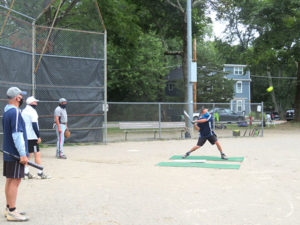Submitted by Beth Bryant (for EMASS Senior Softball League)

Photo/submitted
Region – With 400 winter-worn seniors signed up by March, the Eastern Massachusetts Senior Softball (EMASS) League was itching to get on real grass. The joys of line drive hits, as well as the pain of early spring muscle pulls, were just around the corner. Then the 2020 pandemic hit and their world shut down. Like every other organization, the EMASS leadership was looking at tough decisions. Where many senior leagues across the country canceled in the face of such uncertainty, the EMASS board took a more hopeful approach.
“We knew our players would be thunderstruck,” said Walker Royce, the EMASS Commissioner. “We expected to lose some players, but we knew most of these hearty New Englanders would do whatever it takes to get back on the field.”
The months of March and April brought some bright spots and dark times. Uncertainty seemed to grow more than it shrank. In mid-April, the EMASS board chose to plant a planning stake in the ground, get feedback from members, and then move the stake. They made one educated guess from all the early expert advice: “If we do get to play, it will probably be early July.”
The July 4th holiday is the normal midpoint of the EMASS season. The idea of a “half season” stimulated Jeff Allan, a retired Army officer, to introduce an attractive idea to maximize playing opportunity. His proposal was to combine three weekday divisions that usually play once a week, into two divisions that play twice a week. This would allow EMASS members to play the same number of games as a normal 24-week season but crammed into a 12 week schedule. That stake in the ground was proposed to all members to gauge how many people would drop out because of health concerns and how many people really wanted to play.
The twice-a-week play idea received an overwhelmingly positive response. With less than 10 percent withdrawals, EMASS had plenty of players for 6-8 teams in both weekday divisions. The division coordinators formed teams and published rosters.
The EMASS board prepared a serious plan for reopening in the context of a pandemic. It took several drafts as the social distancing standards and mask usage evolved across the public sector. Hal Iverson, a retired financial compliance officer, pushed the guidance to satisfy town officials that EMASS planned to reopen with low risk of spreading infections. One key theme was to avoid changing any rules of the game. Instead, they defined COVID mandates as “sportsmanship.”
The EMASS season opened on July 6 as Massachusetts entered Phase III. The towns approved the proactive EMASS guidance and issued permits. It took a game or two for everyone to learn unnatural new behaviors, but with players occasionally reminding each other, there was rapid adoption within a week. Hundreds of passionate EMASS seniors were out on the field doing their best to avoid early season hamstring pulls. With facial coverings concealing the identity of every batter, there is a new dimension of suspense to the game and much more confusion in the outfield. Nobody can tell whether the batter is a 55 year old bomber or a 75 year old dinker. Everyone loves it, because they are playing.

















